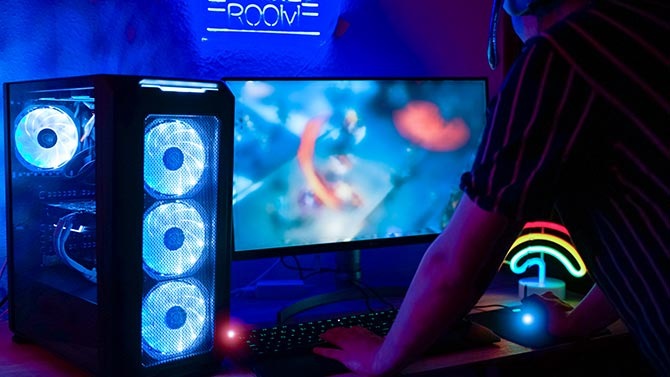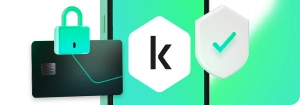
Serious gamers take great pride in their rigs. Some gamers spend thousands of dollars on custom-built set-ups that offer enough speed and power to get the edge on the competition.
But, while you’re busy 360 noscoping opponents, hackers could be silently stealing your most sensitive data.
Gamers sometimes forget about antivirus protection. Worse still, some people turn off antivirus entirely to boost their PC's performance. That's a big mistake because gamers are more vulnerable to online threats than most other groups of people.
5 biggest risks for gamers
Because gamers are online so much, they tend to store a ton of data online. Think about it -- you probably have your credit card and PayPal details stored on several services so that you can make easy online purchases. You might use a social media profile as a single sign-on for multiple platforms. And, if you've invested a lot in your gaming, you might have an account with lots of valuable collectibles and add-ons, which makes you a juicy target for hackers.
Cybercriminals will use every tool at their disposal to trick you into revealing your personal data. Here are a few tactics that gamers should watch out for.
Phishing
Phishing involves sending a fake message that pretends to be from a legitimate service. The idea is usually to trick you into visiting a counterfeit website. Because you think that you’re on the right site, you’ll enter your username and password. This then goes directly to the cybercriminals.
For instance, you might get an email telling you that there is a problem with your PlayStation or Xbox account, and you need to reset your password, with a link asking you to Click Here. When you click on the link, you get taken to what looks like the real PlayStation or Xbox website -- but it’s not. If you enter your credentials into this site, those details will go straight to the criminals, who can now log into the real sites and access your data.
Malware
Malware can infect your computer from any number of sources, including disreputable websites and infected email attachments. Some malware can be quite dramatic, such as ransomware, which holds all of the data on your machine hostage. The ransomware will prevent you from doing anything unless you pay a ransom, which you’ll often have to do in the form of cryptocurrency.
Other types of malware are more insidious. In fact, you may have viruses on your PC for months without knowing about them. For instance, a keystroke logger will silently gather all input from your keyboard and broadcast it back to cybercriminals. They can use this data to figure out things like passwords and credit card numbers.
In-game fraud
Gamers often organize their own trades of collectibles and skins outside of the game’s official marketplace. These deals are a common source of fraud. The most basic form of this fraud is that someone promises to send you payment in exchange for a digital item. You send the item through, but the payment never arrives.
More sophisticated criminals will use in-game fraud as a springboard for more sophisticated attacks. For instance, they might send you an email with an attachment that contains malware. Or they might ask for your payment details and then use this information to attack your bank account.
Mobile malware
Smartphones – both iOS and Android – offer a range of new opportunities for hackers. They can use mobile malware to harvest data such as passwords and payment details. They can also use malware to intercept confirmation messages required for Two-Factor Authentication.
Smartphones are popular attack vectors for cybercriminals because most people simply don’t think of the dangers. Most of us are familiar with desktop viruses, but the mobile ecosystem seems pretty safe, especially if you stick to verified apps from the Appstore. However, mobile threats are growing all the time. Data from Kaspersky shows that in 2020 there were over 156,000 new trojans that attack mobile banking apps and over 20,000 new ransomware modules.
Data breaches
Gaming service providers are themselves a potential risk. In January 2021, VIPGames experienced a leak that exposed 23 million user records. These services are constantly fighting to prevent breaches, malware infections, and DDoS attacks. When they get things wrong, it could expose you to real risk.
You’re especially at risk if you use the same password for every site. For example, if you have 100 accounts that use the same password, hackers only need to breach one of them, and then they will have access to the other 99. Even if you do have good password hygiene, data breaches can still expose your email address, date of birth, and payment information.
Antivirus can play a big part in keeping you safe online when you face these threats. That’s why it’s important to choose the best antivirus for gaming that you can find.
Main features of antivirus for gaming
There are a lot of choices when you’re looking for the best antivirus for gaming. You’ll find a range of free and paid options, with some systems offering unique features.
But there are a few things that are absolute must-haves. Keep an eye out for the following:
Gamer mode
The best antivirus for gamers will offer a dedicated Gamer Mode. Once activated, this will automatically detect if you’re in full-screen mode, which probably means you’re gaming. If so, then Gamer Mode will run quietly in the background, so it doesn’t hog resources. It will also avoid sending you notifications while you’re gaming, unless absolutely necessary.
Great performance
Antivirus will use some of your resources, which could slow down your PC. That’s why it’s important to look at industry benchmarks and see which platform is fastest. You can find some useful performance benchmarks on the Kaspersky website.
Anti-phishing measures
Your antivirus suite should have powerful protection against most phishing attacks. Usually, this will mean that the antivirus flags up any suspicious links before you enter your password.
Secure financial transactions
The best antivirus for gaming will offer a safe payments service. When activated, this verifies any payment system that you use to ensure that it is authentic.
Mobile support: You’ll need to protect all of your devices, including mobile. Look for a solution that works on iOS and Android as well as it does on desktop. Ideally, you should look for a service that covers all of your devices with a single subscription.
Customizable settings
If you’ve fine-tuned your PC, you’ll want to also fine-tune your antivirus software. Look for a solution that offers a straightforward interface that allows you to control every aspect of your online safety.
You’ll also need the antivirus software itself to be top-quality. Look for a trusted service that offers up-to-the-second threat preparedness. Hackers try out new techniques every day, so your antivirus provider needs to be at the top of their game.
How to choose the best antivirus for gaming
It might be tempting to go for the cheapest option. People in gaming forums might recommend that you go a step further and have no antivirus protection at all.
But good antivirus software can be a bargain in the long run. Think about how much it would cost if someone hacked your account on your favorite game. Worse still, imagine if they gained access to your PayPal or bank account. For a few dollars a year, you can have peace of mind while you play.
There are some other factors that you should consider when trying to find the best antivirus for your gaming needs. It’s all a balance between:
- Power: Malware is getting smarter every day. It’s better at hiding itself and better at running in the background. A great antivirus will need a powerful engine so that it can peer in every nook and cranny of your system in search of danger. You’ll also need something that’s updated regularly with details of all the latest threats.
- Efficiency: Of course, you also don’t want something that hogs your CPU. Your antivirus should be light and unobtrusive, making resources available for games and graphics. This shouldn’t be a major issue if you’ve chosen a modern, efficient system. Be wary – sometimes the software that comes free with your OS can actually be a major CPU hog.
- Versatility: A great gaming antivirus will come with a whole suite of tools that you can use to stay safe. Ideally, you’ll have a tool for every situation, no matter what you get up to online. This can include things like anti-virus, anti-phishing, content filters, ad blockers, VPN, and a password manager.
- Gamer-friendliness: Finally, the antivirus should understand don’t use their computers like other people. Gamers have unique needs—and unique vulnerabilities. The best antivirus for gaming will always have your back. This will include tools like Gamer Mode that will help you avoid any distractions while you play.
The best antivirus for gaming is the one that keeps you safe without interrupting your sessions. Look for the right balance of strength, performance, and value.
Essential tips for online gamer safety
Online safety is all about having good digital practices and sticking to them. Here are nine essential rules for every gamer.
Don’t assume you’re safe. Many gamers assume that they are safe online because they know more than the average person about their computer. Just because you’re unofficial tech support to your entire family, it doesn’t mean that you’re immune. Cybercriminals get more sophisticated every day, and even the smartest IT pros get stung.
Stay within official sites. When you download from a recognized source, you are reasonably safe from danger. Check to see if your favorite service has a verification system for the software they make available. Remember, Malware can come from anywhere. Even something seemingly harmless like a skin file could contain a virus.
Don’t cheat. Not cheating is pretty good advice anyway, but there’s a specific danger you should be aware of. Cheat Tools are one of the most common tools for popular methods for delivering malware to unsuspecting games. For example, Activision identified around 10,000 gamers who may have put themselves at risk by installing a Call of Duty Cheat Tool that contained a nasty trojan. While that might sound like suitable punishment for cheaters, it could actually put those users in serious danger.
Check that the site is verified before logging in. Secure sites have a padlock icon next to the URL in most browsers. This padlock shows that you’re logging into a site with a valid security certificate. To be extra sure, click on the padlock and confirm that it’s registered to the company you were expecting. It's good practice to be wary of any site that you're logging into. You should also try to avoid clicking on links from emails - they could be phishing attacks.
Use two-factor authentication (2FA) where possible. 2FA is the system that sends a confirmation SMS or email before you can complete your login. It’s annoying sometimes, especially if you don’t have your phone nearby. But if it’s annoying for you, just think about how frustrating it would be for a cybercriminal who has stolen your email and password. If you get a 2FA notification when you're not actively trying to log in, you should change your password immediately.
Be careful about sharing personal information. A determined cybercriminal can learn a lot about you from seemingly trivial information. For instance, if you post about your birthday and mention your age, they know your date of birth. They can then use this information to try to access your account. Any personal data that you share online could potentially be used against you, so be careful about what you say.
Use a VPN. Virtua Private Networks help to encrypt your data when it’s traveling from your machine to the destination server. A VPN is especially important if you’re using public Wi-Fi or if you haven’t properly secured your home network. Criminals can perform man-in-the-middle attacks, where you actually connect to their Wi-Fi hub. This allows them to intercept data as it passes along to the destination server. With a VPN, all that data is encrypted, making it useless to anyone who intercepts it.
Use strong passwords. The best password is a unique password. Of course, it can be hard to remember dozens of passwords, especially if each one looks like the result of someone angrily slamming their fist on the keyboard. Your best bet is to use a secure password manager that can create and remember passwords for you. Kaspersky Password Manager is free to download, so you have no excuse.
Remember that if it sounds too good to be true, it probably is. Criminals run all kinds of in-game fraud, from offering to trade items to invitations to join an alliance. So many of these offers are merely an attempt to gain access to your personal information. Take everything with a pinch of salt, and don’t ever trade outside the game’s official trading system.
Don’t sacrifice security for speed. There is always going to be a trade-off between security and speed. Your machine will run faster if the anti-virus is deactivated, and that could give you an edge in a competitive game. But that’s like leaving your front door open while you play – you’re practically inviting criminals to target you. Instead, find an anti-virus with a great gamer mode and use it to protect you without causing lag.
The most important rule of all is to take security seriously. A successful hack could have a devastating effect on your life. Hackers could access your banking and steal your cash, or they could use your personal details to commit identity fraud. Worst of all – they could perform some illicit in-game activity that gets you permanently banned.
Recommended products
Kaspersky can protect you from all major threats, including malware, spyware, and trojans. Each option includes a range of different tools to find any gamer's needs. Discover today how Kaspersky can help you stay top of the league and ahead of the cybercriminals.
- Kaspersky Premium
- Download Kaspersky Premium Antivirus with 30-Day Free Trial
- Kaspersky VPN Secure Connection
- Kaspersky VPN - Download and Try for Free
Further Reading
What is Keystroke Logging and Keyloggers?


